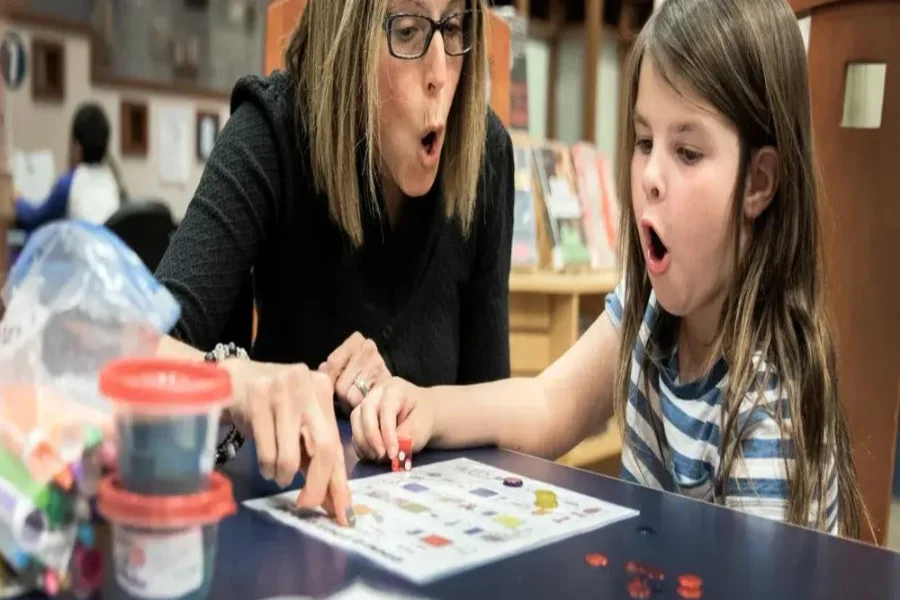
Source: rvdtutor
A Learning Disorder arises when the brain practices information differently, affecting how someone learns and applies new skills. In spite of having average or even above-average intelligence, persons with learning disorders struggle with specific skills, like reading, writing, math, or understanding language. This results in a noticeable gap between their potential abilities and their actual performance in school. Common learning disorders often delay with a kid’s ability to participate or understand non-verbal skills as well.
In this blog, we will explore various Learning Disorder Symptoms, helping to identify key signs in children and understand how these symptoms manifest in different areas of learning.
Types of Learning Disabilities
There are several types of learning disabilities, each affecting different areas of learning.
Below are the three most common types:
Dyslexia
Dyslexia is a language-based disability in which the child finds it difficult to decode words, making it impossible to read fluently. However, this disability is completely treatable with precise therapy treatments. Persons with dyslexia struggle to identify letters, understand letter sounds (phonics) and decode words. They often read more slowly than their groups and may struggle with reading ability. Dyslexia can also impact spelling and writing abilities, making it harder for people to establish their thoughts on paper.
Some key signs of dyslexia include:
- Difficulty recognizing the difference between similar-looking letters.
- Trouble rhyming words or recognizing phonetic patterns.
- Slow and laborious reading.
- Struggles with spelling and mixing up letters in words.
- Avoidance of reading or writing tasks.
Dysgraphia
Writing is a complex skill that requires coordination, appropriate fine motor skills, and correct language knowledge. Difficulty in expressing thoughts using written language is known as Dysgraphia. Dysgraphia is a specific learning disability that affects the child’s motor skills, especially the fine motor skills that impact the way the child holds the pencil spaces his letters, and organises his thoughts on paper.
Dysgraphia affects various skills and writing abilities, including handwriting, spelling, and organizing ideas on paper. Children with Dysgraphia are often mistaken as being irresponsible due to their unorganised traits but they struggle to keep things in place due to neural dysfunction.
Common symptoms of dysgraphia include:
- Poor and inconsistent handwriting.
- Difficulty with spelling, even simple words.
- Struggles with punctuation and grammar.
- Trouble organizing thoughts and ideas in writing.
- Avoiding written assignments.
Dyscalculia
Dyscalculia is a learning disability that affects a person’s ability to understand and work with numbers. This condition makes it challenging to grasp basic math concepts, such as addition, subtraction, multiplication, and division. Individuals with dyscalculia may also struggle with telling time, counting money, and understanding sequences or patterns. This disability can affect day-to-day tasks that involve numerical reasoning.
Some signs of dyscalculia include:
- Difficulty understanding numbers and their relationships.
- Struggles with mental math and arithmetic.
- Trouble telling time on analog clocks.
- Difficulty understanding measurements, such as distance or volume.
- Problems with understanding math symbols or sequences.

Source: gearedtolearn
Symptoms of Learning Disabilities
Every learning disability has its distinct characteristics and it impacts certain developmental areas of the child. Often these symptoms overlap therefore it is extremely crucial to identify the Learning Disorder Symptoms correctly to identify which specific Learning disability the child is facing.
Often the Symptoms of Learning Disabilities start showing once the child starts Preschool especially when the child fails to achieve certain developmental milestones such as basic skills like reading, writing, etc.
Here are some general symptoms of learning disorders to look out for:
Issues with Reading and Writing
When the child faces difficulties decoding words or accidentally writes mirror images of the actual words, the teacher can understand that the child might have a learning disability.
Mathematics Challenges
Sometimes the child cannot make sense of simple concepts such as big and small. Not understanding numbers and mathematical concepts is a common struggle for children with Dyscalculia. These children also find it challenging to tell time, arrange things in an orderly manner.
Language and Communication Problems
Some individuals with learning disorders may have difficulty understanding what is being said or expressing themselves clearly. They may struggle to follow verbal instructions or have trouble putting their thoughts into words.
Memory and Attention Issues
Children with learning disorders may have difficulty remembering information, such as instructions, names, or numbers. They might also be easily distracted, have trouble focusing on tasks, and may seem forgetful.
Social Struggles
Learning disorders can affect a child’s ability to socialize. They may struggle with reading social cues, have trouble interacting with peers, or avoid social situations due to low confidence or frustration.
These learning disorder symptoms can affect a child’s performance in school, and over time, may lead to feelings of frustration or a drop in self-esteem. It’s important to remember that learning disorders are not related to intelligence, and with the right support, individuals can excel in other areas.

Source: thejanusschool
Causes of Learning Disabilities
Learning Disabilities occur due to various reasons but as research suggests they arise due to genetic issues, physical accidents causing brain injuries that can cause neurological disorders, and environmental factors.
Genetics
Learning disabilities often run in families, indicating a genetic component. If a parent or sibling has a learning disability, there is a higher chance that a child may also develop a similar condition. Genes play a role in how the brain develops and processes information, so genetic differences can lead to variations in learning abilities.
Brain Development
Differences in brain structure and function may also contribute to learning disabilities. Certain areas of the brain are responsible for processing specific types of information, such as language, numbers, or visual-spatial skills. If these areas develop differently, it may result in challenges in learning particular skills.
Environmental Factors
Exposure to harmful substances during pregnancy, such as alcohol, drugs, or infections, can increase the risk of learning disabilities in a child. Other environmental factors, such as malnutrition, premature birth, or a lack of early childhood stimulation, can also impact brain development and contribute to learning difficulties.

Source: mosaicearlyed
Diagnosing Learning Disabilities
Diagnosing learning disabilities typically involves a multi-step process that helps professionals identify the specific challenges a child is facing and develop a tailored plan for support.
Observation
Teachers, parents, or caregivers may first notice learning disorder symptoms when a child consistently struggles with academic tasks, such as reading, writing, or math, compared to their peers.
Educational Assessment
An educational specialist or psychologist will conduct assessments to evaluate the child’s strengths and weaknesses. These tests measure specific skills, such as reading, writing, and math, and compare the child’s performance to their peers.
Medical Examination
A doctor may perform a medical evaluation to rule out other potential causes of learning difficulties, such as vision or hearing problems, that could be affecting the child’s ability to learn.
Individualized Education Plan (IEP)
If a learning disability is diagnosed, schools may create an Individualized Education Plan (IEP) to provide tailored support and accommodations. The IEP outlines specific goals for the child and strategies to help them succeed in school.
Identifying learning disorder symptoms initially is essential for helping children to overwhelmed their difficulties and get their full potential. Parents and teacher can provide the necessary support by understanding the types, symptoms, causes, and methods of diagnosing learning disabilities, for children to thrive in their education. Early intervention and modified support can make a significant difference, allowing individuals with learning disabilities to achieve success and confidence in their skills.
Learning Difficulties Courses
Vidhyanidhi Education Society (Govt. Regd. offers Learning Difficulties Courses are essential for educators looking to support students who face challenges in processing information. These course up skill educators with the strategies to identify Learning Disorder Symptoms and apply effective strategies to help student in overwhelming these difficulties. Learning disorder symptoms, such as difficulty with reading, writing, or math, can significantly impact a kid’s educational progress, but with the correct diagnosis, they can succeed.
Vidhyanidhi Education Society (Govt. Regd.) offers a well-structured Learning Difficulties Course, providing:
- In-depth understanding of various learning disabilities.
- Practical strategies to create inclusive learning environments.
- Tool for assessing and identifying various learning needs.
This course is beneficial for ambitious teachers as it develop their skills to recognise and handle learning difficulties, making a positive impact on children lives and prepare teacher to handle diverse classrooms efficiently.
Master the skills to support every learner! Join the LD Course at Vidhyanidhi Education Society (Govt. Regd.) today!
For more details of LD Course Call Whatsaap on +919321024137 +9198699866277
To download brochure of LD Course, Click Here!
LD Course
FAQs
How long is Learning Difficulties Course?
The LD Course is usually last for 1 years by ensuring to get well-trained within a year.
Are Online Learning Difficulties Courses Available?
Yes, online Learning Difficulties Course are available, offering flexibility and convenience for aspiring educators to learn from home.
How to be Certified Remedial Tutor?
To become a certified remedial tutor, complete SEN, LD, and STT courses from Vidhyanidhi Education Society for comprehensive training in supporting diverse learners.



